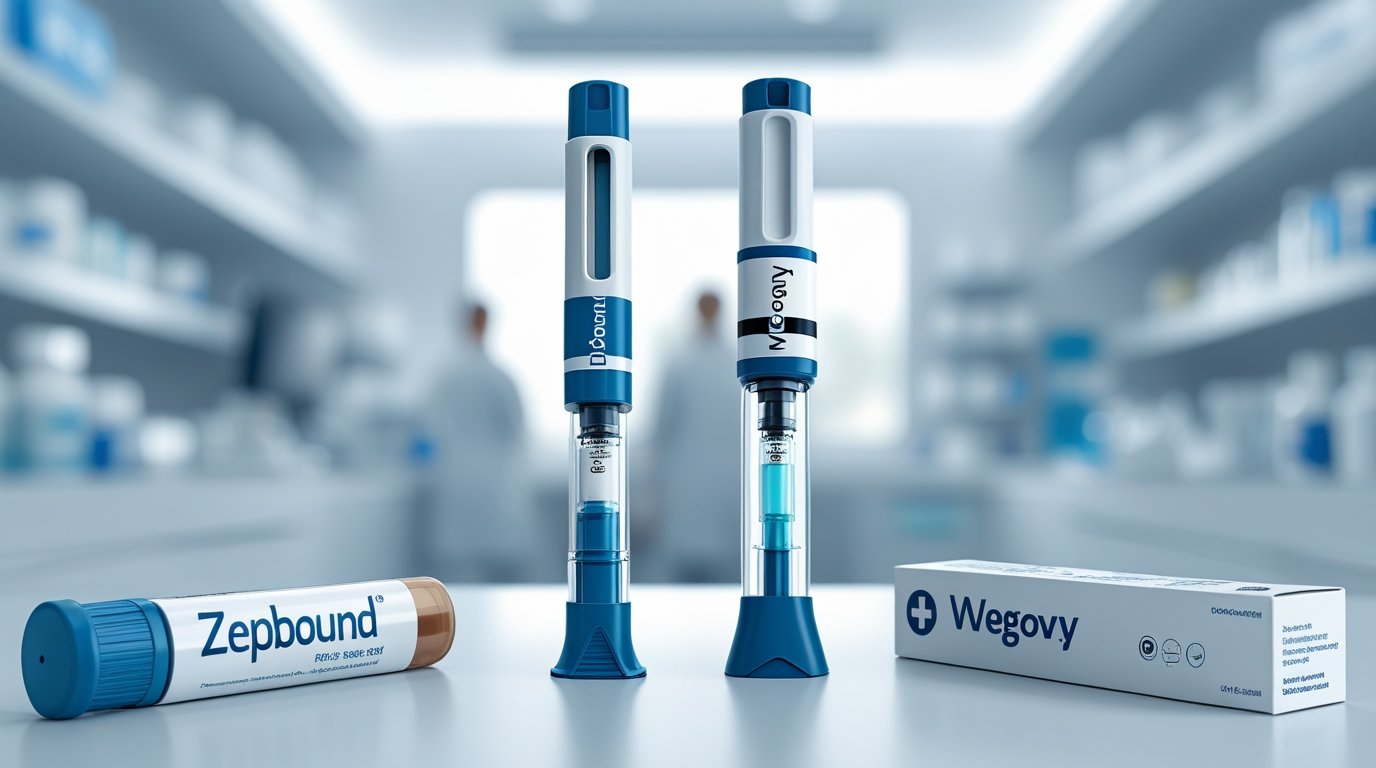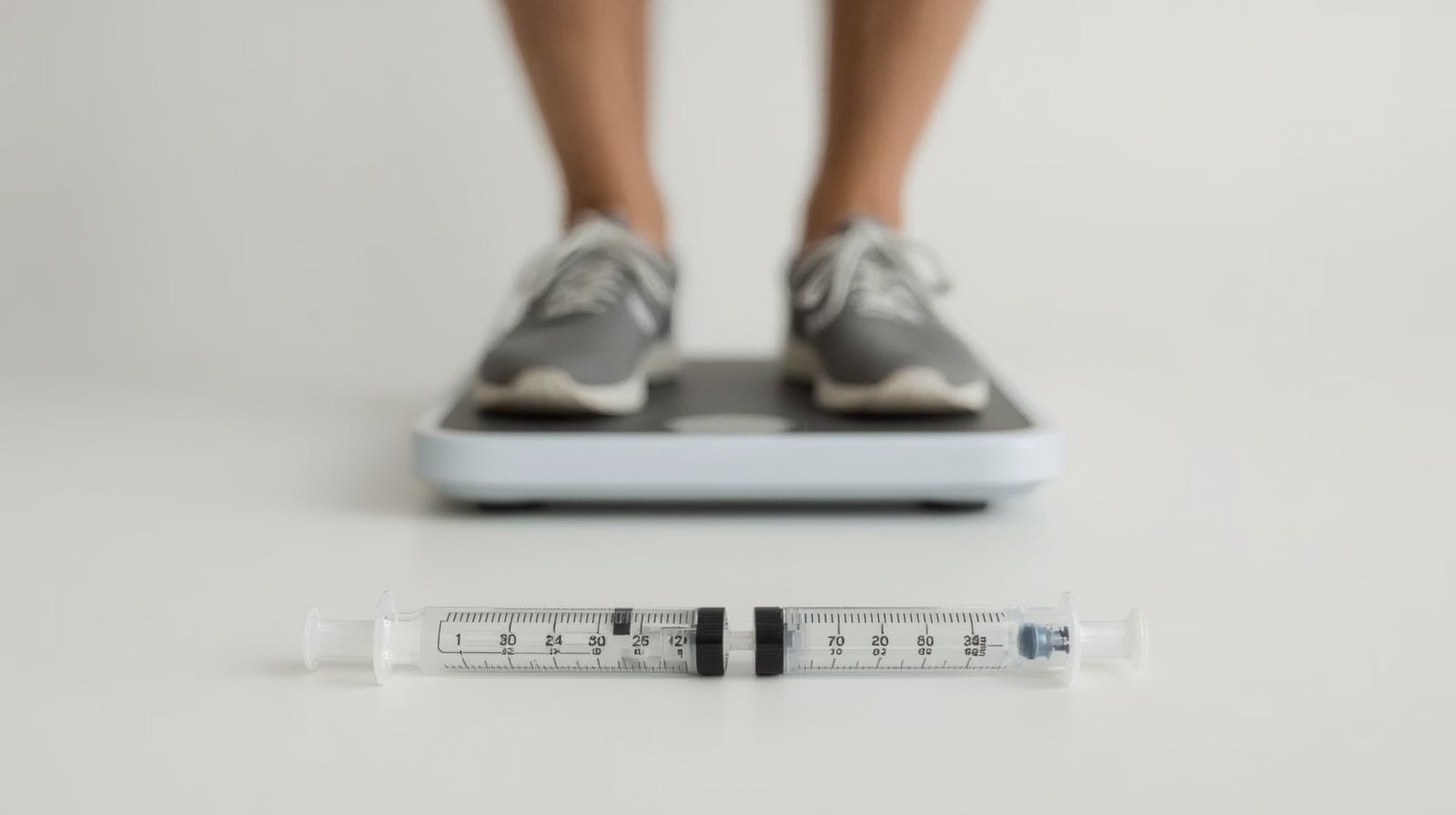
The weight-management drug semaglutide has a half-life of about one week. If you take the medication for weight loss using the recommended once-weekly dosage, it will take five to seven weeks to completely eliminate it from your system. Semaglutide reaches a steady state in the body after several weeks of continuous use, which is important for maintaining its effectiveness.
Semaglutide was first sold as a diabetes drug and was approved for weight loss in 2021. It is an injectable medication, commonly administered once weekly. It proved to be an effective weight loss drug for people without diabetes, with clinical studies showing some patients losing up to 15% of their body weight.
Semaglutide works by mimicking specific hormones in your body. In scientific terms, it’s a glucagon-like peptide-1 receptor agonist (GLP-1 agonist). In other words, semaglutide lowers your blood sugar and suppresses your appetite. It’s especially effective for people with obesity, which is defined as having a body mass index over 30, or overweight people with diabetes or other co-morbidities. Ozempic is primarily used for managing diabetes, while Wegovy is used for long term weight management. Wegovy is FDA approved specifically for long term weight management and cardiovascular benefits.
Though it’s always important to speak to your physician before starting or stopping medication, you may stop taking the drug if you reach your goal weight or if it does not produce the desired results. It’s also important to stop taking semaglutide if it causes unwanted side effects, if you are pregnant, or need surgery. Always consult a healthcare professional for personalized guidance before making any changes to your medication regimen. Here is what to consider when you stop taking this compound.
Table of Contents
- Factors That May Affect How Long Semaglutide Stays in Your System
- Semaglutide Side Effects
- What Happens When You Stop Taking Semaglutide?
- Can You Flush Semaglutide Out of Your System?
- Stopping Semaglutide Before Surgery
- Stopping Semaglutide Before Pregnancy
- When To Talk to Your Doctor
Introduction to Semaglutide
Semaglutide is a medication designed to help manage type 2 diabetes and support weight loss. As a glucagon-like peptide-1 (GLP-1) receptor agonist, semaglutide works by mimicking the action of a natural hormone in your body that regulates blood sugar levels and appetite. By activating these GLP-1 receptors, semaglutide helps increase insulin release when blood sugar is high, slows down digestion, and reduces feelings of hunger. This combination makes it effective for both controlling blood sugar and promoting weight loss. Semaglutide is available under brand names such as Ozempic and Wegovy, and comes in both injectable and oral forms. Understanding how semaglutide works in your body is key to managing blood sugar changes and achieving your weight loss goals.
Pharmacokinetics of Semaglutide
The pharmacokinetics of semaglutide describes how your body absorbs, distributes, breaks down, and eliminates the medication. Semaglutide is known for its long half-life—about one week—which means it remains active in your system for several weeks after your last dose. After you take your regular dose, the medication is gradually processed and removed from your body through urine and bowel movements. Factors such as your body weight, age, and kidney function can influence how quickly semaglutide is cleared from your system. For example, people with higher body weight or reduced kidney function may find that semaglutide stays in their system longer. Understanding the long half-life and elimination process of semaglutide is important, especially if you are taking other medications or need to plan for changes in your treatment.
Factors That May Affect How Long Semaglutide Stays in Your System
Several factors influence how long semaglutide stays in your system after you stop weekly semaglutide injections. These include:
- Dosage: If you use the drug for weight loss, you will likely take a higher dose than a diabetes patient. The highest dose will result in more of the drug in your system, while a lower dose may be eliminated more quickly.
- Kidney function: Semaglutide gets processed and eliminated through the kidneys. If you have decreased kidney function, it could take longer to leave your system.
- Weight: People who remain overweight after taking semaglutide may have the drug in their body longer because the medication gets distributed across a larger body mass.
- Hydration: You cannot flush semaglutide out of your system with water. However, drinking enough water can ensure proper kidney function, which could speed the elimination of the compound. There is no way to make semaglutide leave your system faster than its natural elimination process.
Missing two doses in a row can impact how much semaglutide remains in your system and may affect treatment outcomes.
It can take several weeks for semaglutide to completely leave your system.
Interactions with Other Medications
When starting semaglutide, it’s important to consider how it might interact with other medications you are taking. Semaglutide can interact with other diabetes medications, such as insulin or sulfonylureas, which may increase the risk of low blood sugar (hypoglycemia) or, in some cases, high blood sugar (hyperglycemia). It can also interact with medications that affect your digestive system, including antacids and H2 blockers. To ensure your safety and avoid unwanted blood sugar changes, always inform your healthcare provider about all medications and supplements you are taking before starting semaglutide. Your healthcare provider can help you manage these interactions and adjust your treatment plan as needed.
Semaglutide Side Effects
Semaglutide is the active ingredient in diabetes and weight loss drugs. It is a long acting medication and part of a class of drugs known as receptor agonists. Though the administration deems it safe to use, there are some possible side effects.
Here are the most common ones you might encounter:
- Gastrointestinal problems like diarrhea, constipation, or stomach pain are common.
- Headaches and nausea occur in 20% to 25% of patients.
- Fatigue is another common complaint, with one in ten people feeling tired while on the drug.
- Heartburn can occur when you eat while on semaglutide.
- Kidney disease, gallstones, and hair loss are rare but can occur in some cases with long-term use.
One of the most common effects is rebound weight gain after stopping semaglutide. Two-thirds of people experienced weight gain as their appetite returned after stopping the medication. People who have lost weight during treatment may regain weight if they stop taking semaglutide.

What Happens When You Stop Taking Semaglutide?
Several different things will happen when you stop taking semaglutide or stop taking Ozempic. When you stop semaglutide or stop taking Ozempic, you may experience changes in blood sugar and appetite. As Ozempic stays in your system for several weeks, it can take time for the body to adjust after stopping. Ozempic takes about five weeks to fully leave your system, and during this period, you may notice withdrawal effects as your body adjusts, such as changes in appetite and blood sugar. It is important to work with your healthcare provider when stopping Ozempic or if you plan to stop semaglutide, as quitting semaglutide cold turkey can increase the risk of withdrawal symptoms and elevated blood sugar levels.
Here are the most common effects you’ll experience once you discontinue the drug:
- Blood sugar levels will rise. Elevated blood sugar levels are a common withdrawal effect, especially if you are using the drug for weight loss but also have diabetes or are at risk for developing it. You need to monitor your blood sugar levels carefully to get an early warning about potential problems.
- Increased hunger is possible as the semaglutide disappears from your body. You will feel more and more hungry, potentially jeopardizing your weight loss gains.
- Blood pressure or cholesterol levels, which are often lower when you take semaglutide, could rebound after coming off the drug.
Lifestyle changes are often necessary to maintain the initial weight loss. The body adjusts gradually after stopping semaglutide, and weight regain is possible if lifestyle changes are not maintained. You often need to plan for stopping the medication to ensure you avoid these potential problems.
Is a GLP-1 Medication Right for You?
Can You Stop Taking Semaglutide Cold Turkey?
You can stop taking semaglutide and other semaglutide products immediately. However, you can reduce unwanted effects like weight rebound by stepping down doses gradually.
If you have a missed dose, take it as soon as possible within 5 days after your usual injection day. If more than 5 days have passed, skip the missed dose and resume your regular schedule on your next usual injection day.
Some doctors recommend tapering doses and monitoring weight gain, blood sugar levels, and other factors. It is important to seek personalized guidance from your healthcare provider when adjusting your medication schedule, as they can help you plan step-down processes and monitor your weight and vitals to detect potential problems early.
Semaglutide Withdrawal Symptoms
The withdrawal symptoms of semaglutide are related to blood sugar or blood pressure increases. Here are some of the most common problems you may encounter.
- Nausea
- Dry mouth
- Breathing difficulties
- Headaches
- Dizziness
- Heart palpitations
- Blurred vision
- Mood changes
Some gastrointestinal symptoms, such as nausea and changes in bowel movements, may last for a few weeks after stopping semaglutide. Stopping semaglutide may also increase the risk of complications, such as cardiovascular events like heart attack or stroke, especially for those with pre-existing health conditions.
As with weight gain effects, you can limit the severity of these symptoms by gradually tapering the medication and adjusting your lifestyle or diet or starting other medications to address these changes. People with certain health conditions may experience more pronounced withdrawal effects.

Managing Blood Sugar Changes
Taking semaglutide can lead to changes in your blood sugar levels, so it’s important to monitor your blood sugar regularly. Both hypoglycemia (low blood sugar) and hyperglycemia (high blood sugar) can occur, especially if you are also taking other diabetes medications. Your healthcare provider may recommend adjusting your semaglutide dose or the doses of your other medications to keep your blood sugar levels in a healthy range. In addition to medication adjustments, changes to your diet and exercise routine may also help manage blood sugar changes. Regular communication with your healthcare provider is essential to ensure your blood sugar levels remain stable while taking semaglutide.
Can You Flush Semaglutide Out of Your System?
You can flush your system by drinking large amounts of liquid to get unwanted compounds out of your body through your urine. Semaglutide will not leave your system any faster if you do this. However, staying fully hydrated can improve your kidney function, making it possible to process and eliminate the drug as soon as possible. This usually takes about five weeks from the last dose.
Stopping Semaglutide Before Surgery
Semaglutide medications slow down the digestive process. This means food can potentially get regurgitated and block the airways, which could cause problems for patients under anesthesia for surgery.
For this reason, the American Society of Anesthesiologists recommends stopping weekly doses of semaglutide products the week before your surgery. You can resume the doses as soon as you wake up after your surgery. It’s always important to disclose to your physician that you are taking these medications and get their recommendations on when to start and stop taking semaglutide.
Stopping Semaglutide Before Pregnancy
Semaglutide may cause pregnancy complications. Research on humans is not conclusive, but animal studies have shown cause for concern about the potential effects of semaglutide during pregnancy.
The manufacturers recommend stopping the drugs eight weeks before you try to get pregnant to eliminate the risk of complications potentially associated with the medication.
If you become pregnant unexpectedly, you should consult a doctor and stop taking the drug immediately.
When To Talk to Your Doctor
There are several reasons to talk to your doctor about stopping semaglutide. If you haven’t seen notable results after four or five months, you might consider stopping. Also, if you have to have surgery or are trying to become pregnant, you will need to wean yourself off the drug.
While you’re unlikely to experience withdrawal, the appetite-suppressant properties will disappear over time, so you will need to continue managing your weight through diet and exercise.
Semaglutide can be an effective weight loss option for people with obesity or those who are overweight and have a comorbidity like diabetes or hypertension. However, it is important to understand how the drug works in your body and how long it takes to eliminate it from your system so that you can avoid any unwanted effects.





















